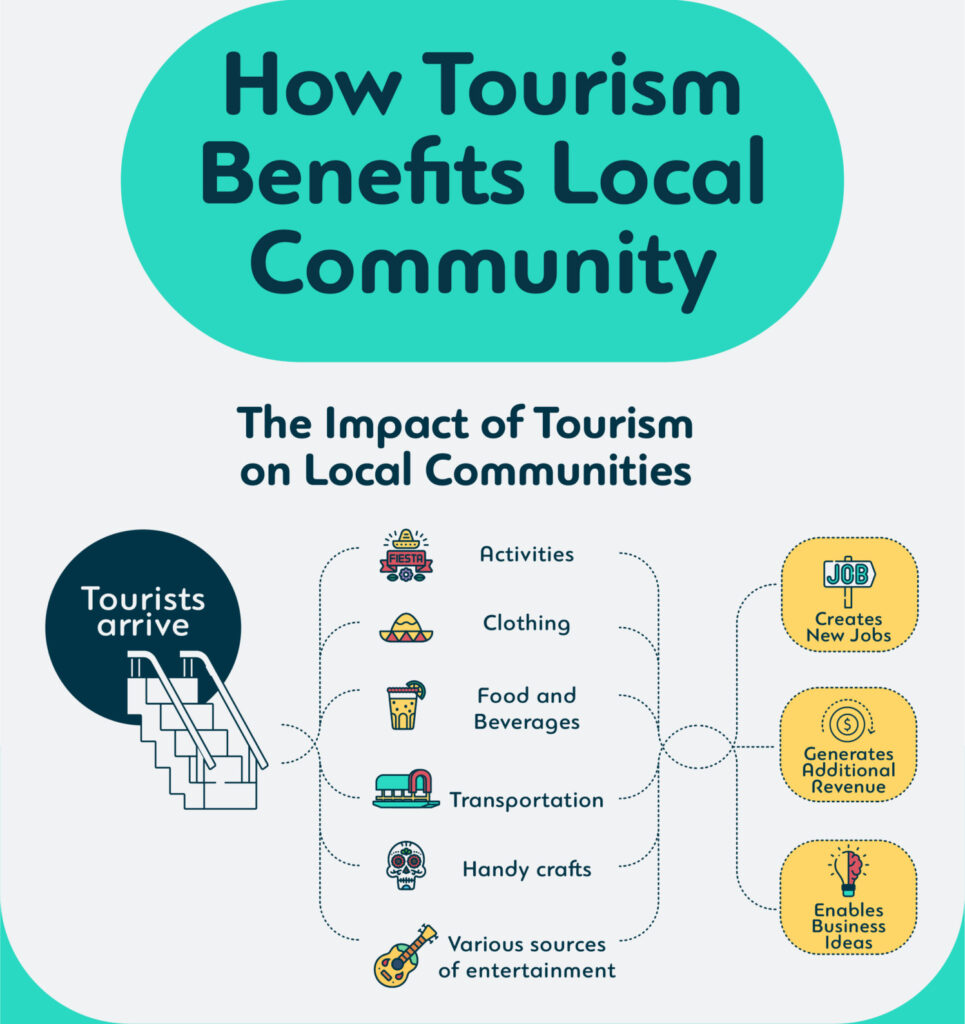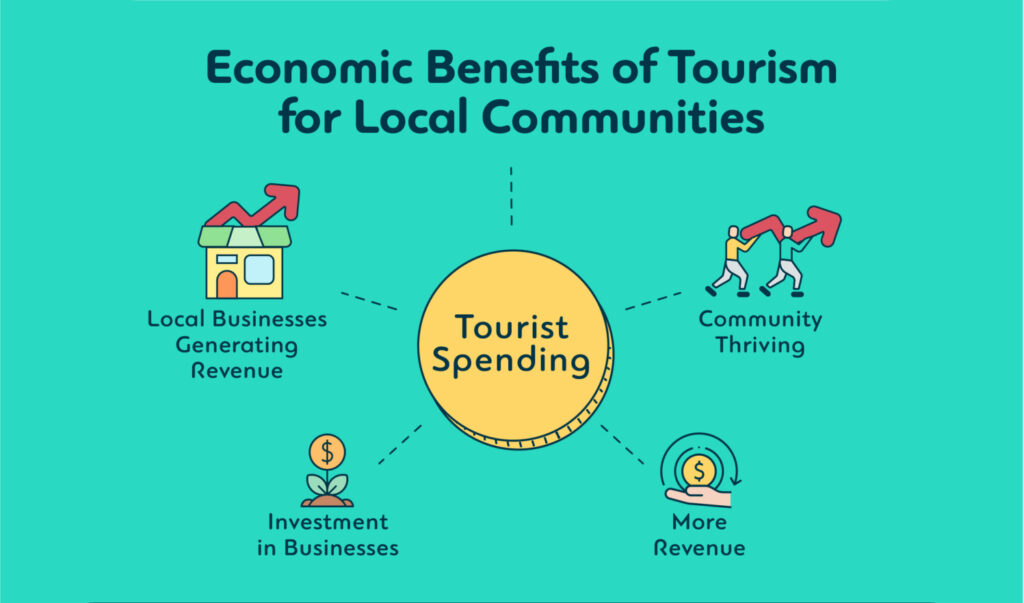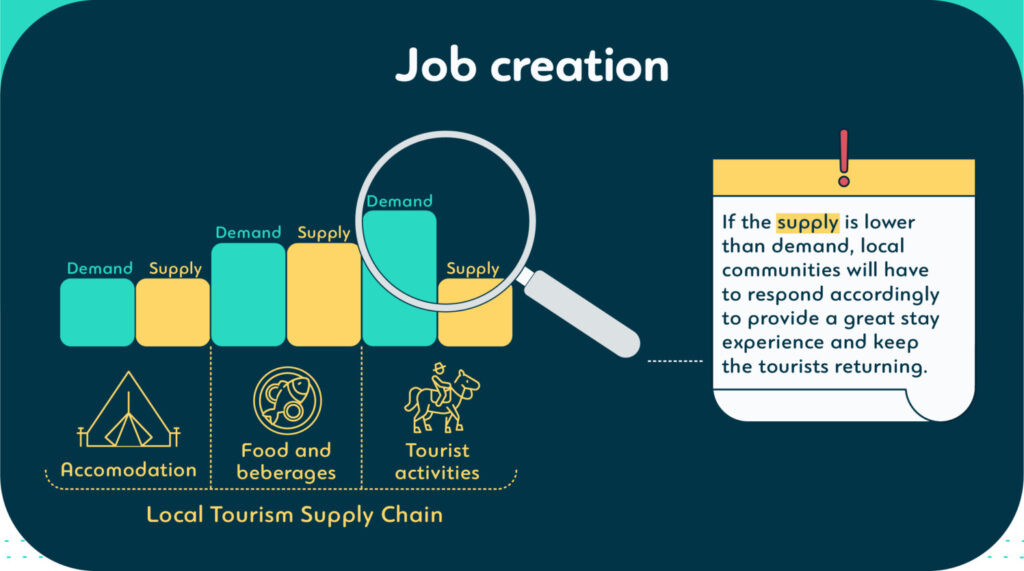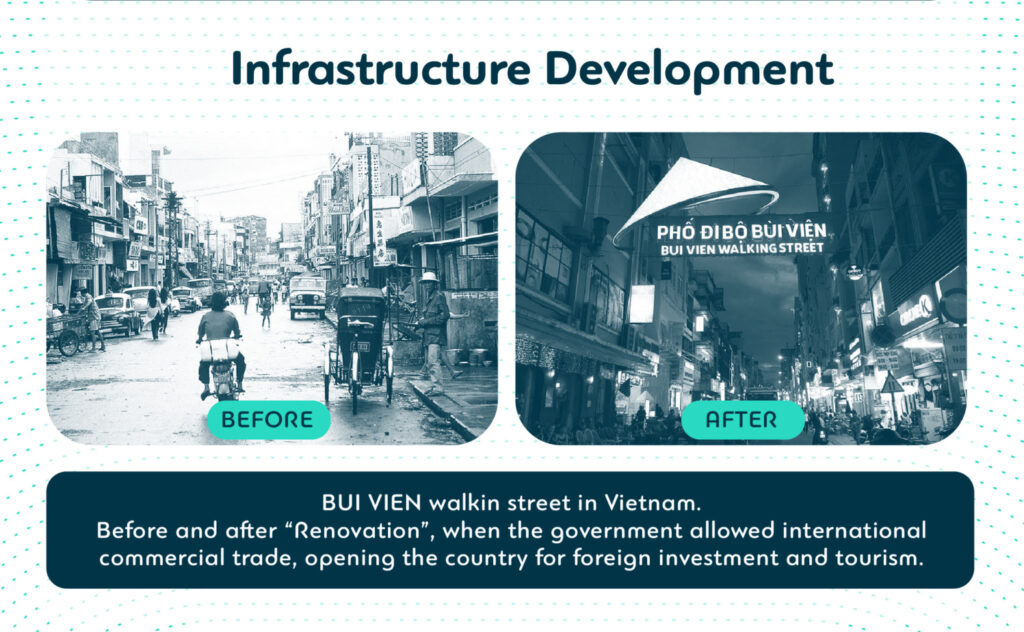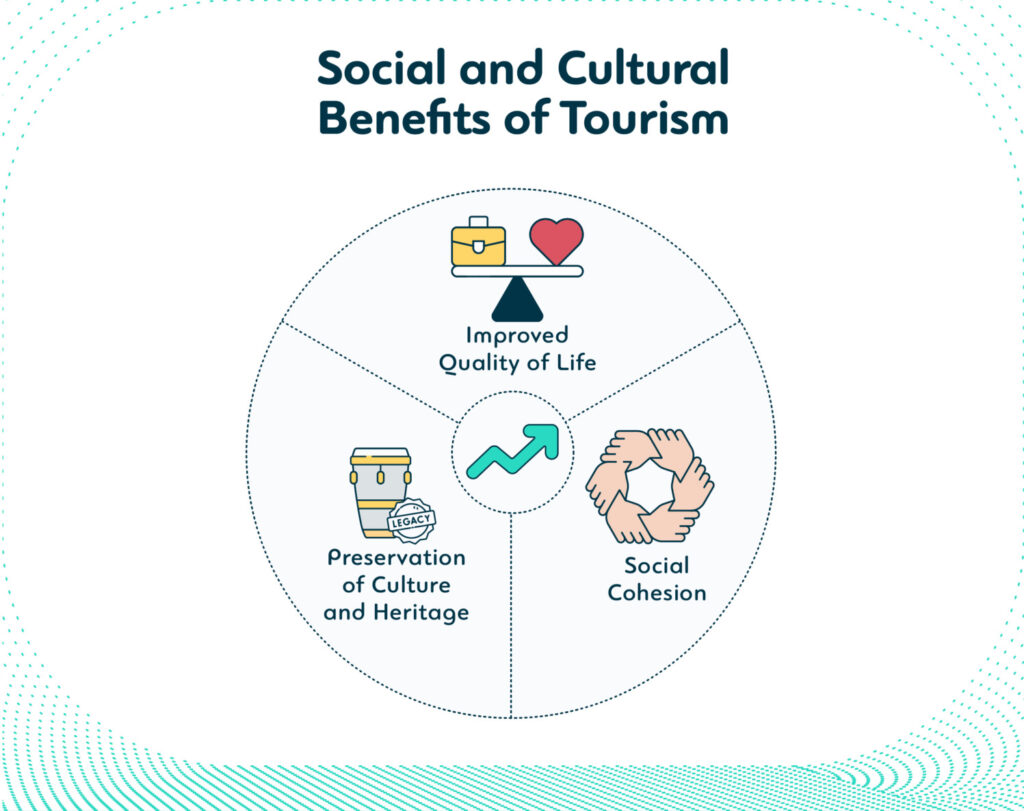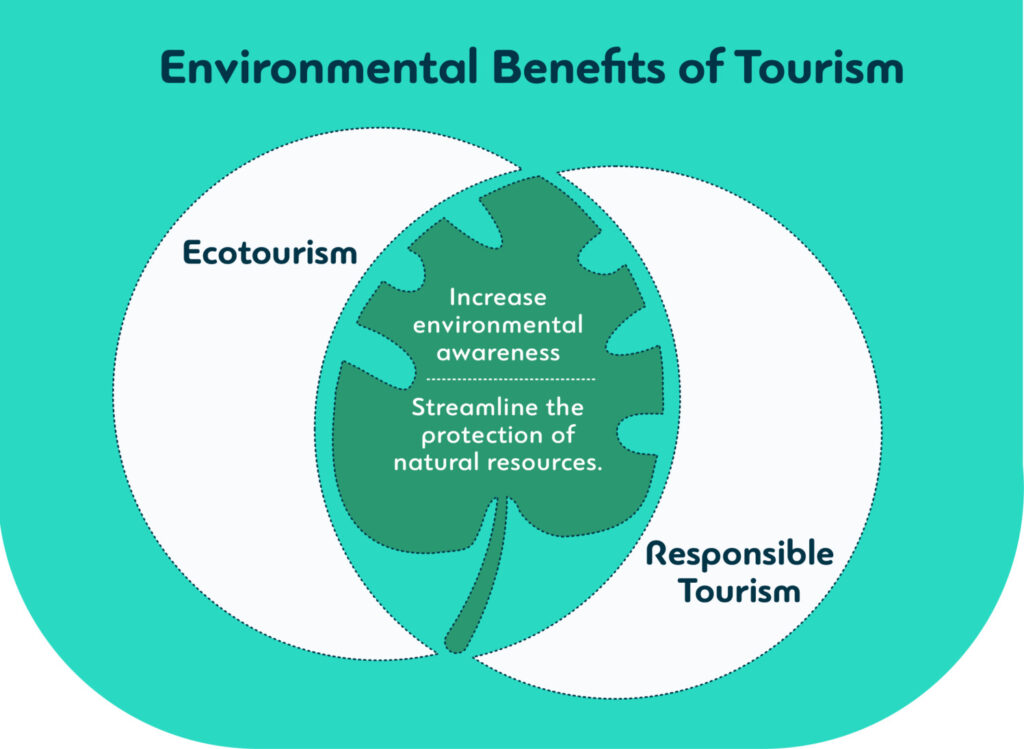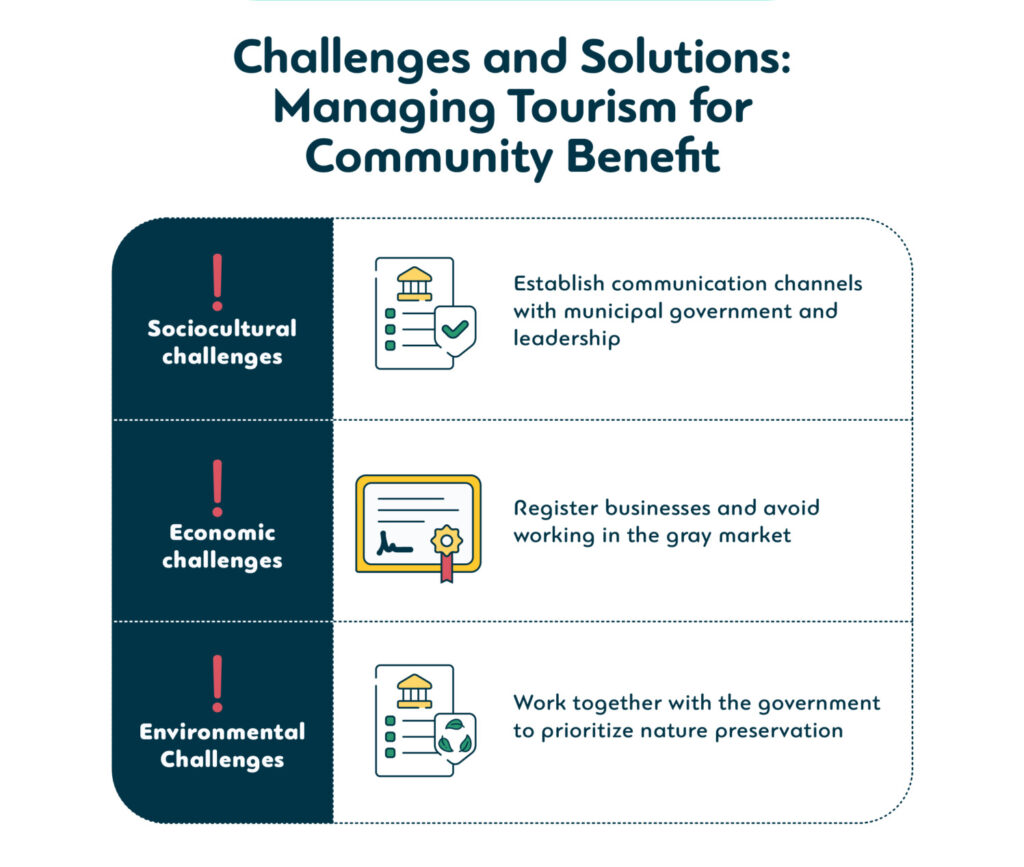Unveiling How Tourism Benefits and Empowers the Local Community
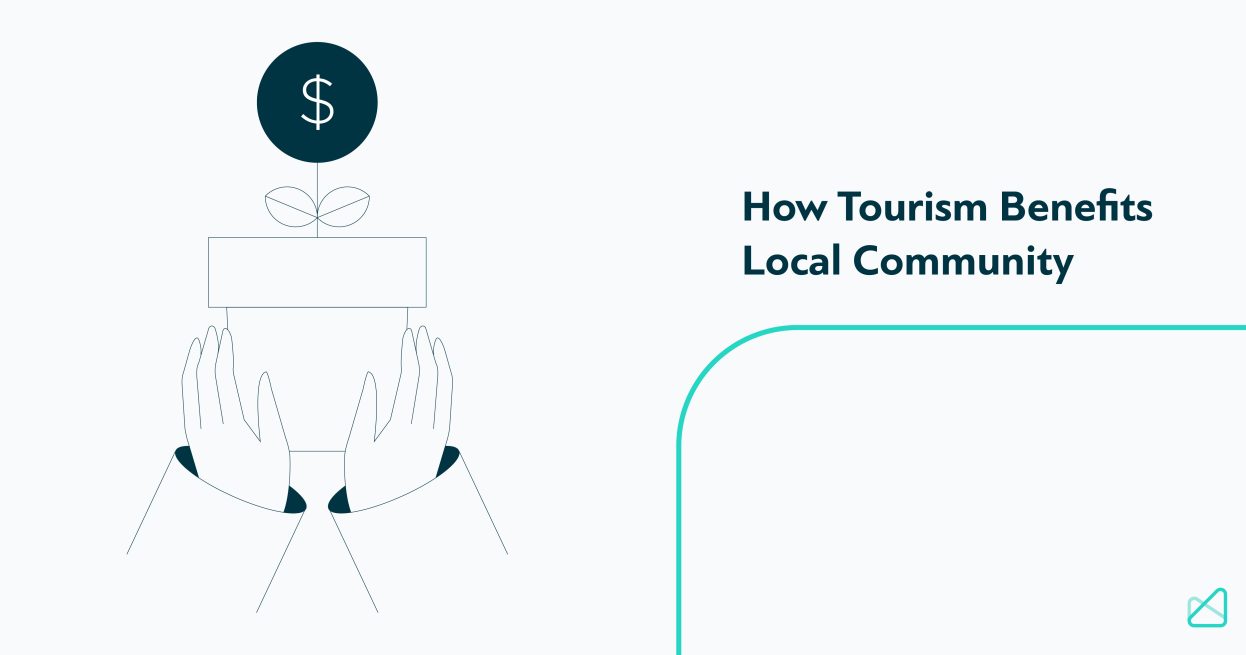
The tourism industry is a vertical with one of the most comprehensive impacts on economic and social landscapes. That’s precisely what makes it essential for macro- and micro-economies. Tourism can help generate additional revenue streams for local communities enabling locals to kickstart new businesses, rebuild and restore structures, and attract more tourists.
If you want to discover the impact of tourism on the local community, you’ve found an excellent resource. Below you can learn how tourism benefits local communities, real-life examples, and the most common challenges and solutions of managing tourism for community benefits.
The Impact of Tourism on Local Communities
To truly understand how tourism benefits local communities, you need to understand its impact. Let’s see the tourism industry’s power to shape communities socio-economically and its direct and indirect impacts on numerous aspects of local life.
How tourism shapes communities socio-economically
The best way to recognize tourism’s potential to shape the social and economic aspects of local communities is to approach the subject with financial experts’ goggles on.
When many tourists arrive at a destination, their needs, expectations, and wants generate demand. The demand, in this instance, can be pretty diverse. New arrivals can generate demand for:
- Food and beverages
- Activities
- Clothing
- Transportation
- Handy crafts
- Various sources of entertainment
This specific outcome has a positive economic impact on a community. It creates new jobs, generates additional revenue, and enables people to pursue various business ideas that were borderline impossible before the arrival of tourists.
The social impact follows the economic one. Local communities become more financially independent. Community participation in business activities enables it to become financially secure, stress-free, and experience feelings of ease and safety. However, tourism’s impact doesn’t end there. It has numerous direct and indirect effects on various aspects of local life.
The direct and indirect impacts of tourism on various aspects of local life
The subject of tourism’s impact on various aspects of local life has been of interest to researchers since the early 1980s. While the general consensus is that it is difficult to measure these effects, they are still there.
Tourism’s direct and indirect impacts can contribute to changes in the following ways:
- Value systems
- Individual behavior
- Family relationships
- Collective lifestyles
- Moral conduct
- Create expressions
- Traditional ceremonies
- Community organization
Economic Benefits of Tourism for Local Communities
Now that you understand how tourism impacts local communities economically, we must dive deeper into the matter. Below you can find three unique economic benefits of tourism for local communities.
The multiplier effect: How tourist spending stimulates local economies
The multiplier effect directly results from tourists buying products and services in their destination. Tourists can buy a wide range of products and services while visiting or staying. These range from food, drinks, and transportation to locally produced goods and locally led excursions and activities.
Suddenly, you have local businesses of all sizes generating revenue. With the surplus in the local budget, the community can thrive. It increases not only their standard of life, but they can now invest in their businesses to make their products and services more attractive, thus generating repeat business and even more revenue.
Job creation: An in-depth look at how tourism creates employment opportunities
The most immediate benefit of tourism is job creation. The tourism services value chain consists of travel organization and reservations, transport from and to the destination, accommodation, food and beverages, and tourist activities. The last three items on this list are of interest to you.
In other words, local communities can benefit from job creation in accommodation, food and beverages, and tourist activities. How does this happen? Tourists create demand for products and services in these three categories. If the supply is lower than demand, local communities will have to respond accordingly to provide a great stay experience and keep the tourists returning.
Most often, new jobs will open in hotels, restaurants, small businesses, transportation companies, and tourist activity businesses.
Infrastructure development: Exploring how tourism funds improve local facilities and services
Remember that surplus in local budgets we’ve mentioned above? Local communities can now use it to facilitate infrastructure development which is yet another benefit of tourism for local communities. That’s perhaps the most noteworthy benefit because tourism infrastructure directly contributes to tourism growth and competitiveness.
The increasing funds in local businesses’ budgets and municipal budgets enable various projects. For instance, hotels can go through renovation and build new facilities; cities can renovate roads and build new ones to facilitate access to tourist attractions; they can invest in newer and better means of transportation, and so on. The bottom line, tourism funds can kickstart community-based tourism development overall.
Case study: A real-life example of a community that has economically benefited from tourism
Here is a real-life example to help you understand tourism’s importance to local communities. A case study of Bomborat Chital from 2018 is a perfect one to paint the picture of the economic benefits of tourism for local communities.
Over 92% of respondents said that tourism was vital for the economic development of their community and region. The respondents said that tourism led to an increase in:
- Household income
- Improved infrastructure
- Hotel business growth
- The capability of acquiring knowledge related to tourism and hotel management
Tourism has also helped increase the demand for local fresh and dry fruits, hand-crafted goods made by the locals, hotels, and transport.
Social and Cultural Benefits of Tourism
Tourism doesn’t offer only economic benefits to local communities. It can also bolster the social and cultural aspects of a local community. Let’s see how.
Preservation of culture and heritage: How tourism motivates communities to preserve and showcase their cultural assets
How can tourists motivate people to preserve and showcase their cultural assets? You probably know what cultural tourism is. Here is a quick reminder:
“Cultural tourism is a sub-segment of tourism which is focused on visiting destinations to experience and learn about a particular culture first-hand.”
Simply put, it creates demand for cultural assets. Cultural attractions can range from cuisine and national holidays to local outfits and customs. This demand can motivate communities to preserve the things that help them generate income.
Improved quality of life: Exploring how tourism’s economic impact can lead to enhanced living standards
Improved quality of life follows the economic benefits of tourism. The theory is rather straightforward – if families in certain regions have access to more income, their quality of life will improve. Such is the case with regions where tourism flourishes. Additional revenue streams and increased revenue can help people in certain regions achieve enhanced living standards.
Living standards include the level of wealth, material goods, comfort, and products and services available to a geographic area. Since tourism helps improve infrastructure, create new jobs, and generate repeat business, local communities can achieve an improved quality of life.
Social cohesion: Analysis of how tourism can bring communities together
Finally, tourism can help improve social cohesion and bring communities together. While the mechanism behind this benefit is not as obvious, it’s easy to understand it once your attention is brought to it.
Here is how it works: tourism creates opportunities for people from all socioeconomic tiers (wealth, income, race, education, and power). It also creates opportunities for people to learn and understand each other, thus promoting equality, collaboration, and working towards achieving a common goal despite their differences.
Case study: A real-life example of a community that has experienced social or cultural benefits from tourism
The Namibia tourism case study is an excellent example of how tourism can unlock social and cultural benefits. The country’s government has been focusing on tourism since the early 2000s. Initially, the primary goal was to promote and enable tourism purely for its economic benefits.
However, the government discovered that it also has cultural and social benefits. It enabled people to come and work together around a common cause. In this case, people came together to preserve cultural heritage. The tourism policy also included pro-poor aspects to help relieve poverty and facilitate the development of communities in rural areas.
Environmental Benefits of Tourism
Ecotourism and responsible tourism are buzz works in the travel vertical. These types of tourism can help local communities conserve and preserve wildlife and natural wealth. Below you can find out more about the environmental benefits of tourism.
Conservation efforts: How tourism contributes to the preservation of natural resources
In some instances, wildlife and nature itself can be the main attractions and primary reason tourists come to visit. It’s a crystal clear message to local communities that they need to conserve these natural resources to keep generating income from tourism.
Plus, governments worldwide have joined together in the initiative to preserve nature. This double effect facilitates the entire initiative and helps motivate communities, even in rural areas, to start preserving nature and wildlife.
Sustainable tourism: The role of ecotourism in fostering environmental awareness and protection
Sustainable tourism is a broad concept. While it covers tourism experience, it also includes concerns for environmental issues. Governments with relevant policies try to enforce sustainability across industries in their effort to minimize their carbon footprint.
These policies apply to all communities. It helps increase environmental awareness and streamline the protection of natural resources.
Case study: A real-life example of a community that has benefited environmentally from tourism
Bhutan’s government developed an excellent policy to structure ecotourism, maintain community involvement, and still generate profits. Bhutan has a daily tariff every tourist must pay to experience what this country has to offer.
The tariff involves the necessary expenses such as hotel, food, tour guide, trekking equipment, and internal transportation. The enforced tariff ensured that only respectful and responsible tourists visited. In return, the communities in Bhutan can continue to effortlessly preserve nature and the environment overall.
Challenges and Solutions: Managing Tourism for Community Benefit
As you’ve seen in the previous example, the government played a vital role with its laws and regulations in enabling local communities to thrive while still reaping the benefits of tourism. What are the potential negative impacts tourism can have then? Let’s see.
Analysis of potential negative impacts of tourism on local communities
Many things can lead to negative impacts of tourism on local communities. A recent study reveals that the most common factors are:
- Inadequate government planning,
- Policies and regulations,
- Insufficient knowledge and skills of tour operators,
- and the broader social issues.
Below you can find the potential challenges that can impact three areas, including strategies for communities to maximize benefits while minimizing potential drawbacks of tourism.
Sociocultural challenges
Tourists with little to no awareness can irritate the local communities by failing to respect local customs and values.
The best strategy would be for local communities to establish open communication channels with municipal government and leadership. Working together, they need to come up with relevant policies and regulations.
Write brochures and put on relevant signage to communicate local customs, rules of conduct, and other important information.
Economic challenges
Overcrowding can worsen the sanitation status and break down already poor infrastructure. Local communities should always register businesses and avoid working in the gray market because it not only brings tax income to local budgets but provides legal protection.
Local communities should only collaborate with reputable and licensed tour operators. These practices can secure enough funds in local budgets to help preserve the sanitation status and streamline infrastructure maintenance and improvements.
Environmental Challenges
Overcrowding and poor regulations can disrupt nature and wildlife, thus indirectly affecting communities and making destinations less attractive to tourists.
Local communities can thwart this risk in multiple ways. For instance, with sufficient money in local budgets, they can fund nature preservation societies, launch voluntourism projects, and work together with the government to prioritize nature preservation.
Conclusion
As you can see, tourism benefits local communities in several ways. Economic benefits include local economic stimulation, job creation, and infrastructure development. Social and cultural benefits include improved quality of life and social cohesion. And environmental benefits include improved conservation, preservation, and promotion of sustainable tourism.
The role of tourism is crucial for community development and enrichment. Yes, it also comes with adverse effects, but with the right strategies, such as collaboration with local governments, communities can overcome these challenges and start generating revenue.
FAQs
The most noteworthy strategies include having relevant rules, regulations, and policies. It’s also essential to maintain communication with the government. There has to be a plan with clearly defined goals followed by a comprehensive strategy and execution timeline.
Collaboration with tour operators and local government can help local communities manage the negative impacts of tourism. Preventing overcrowding and staying true to sustainable practices is paramount in this instance.
Local government plays a vital role in promoting sustainable tourism. Enforcing relevant rules and regulations can help the community develop better behavior patterns and join forces in promoting sustainable tourism.
Local businesses should definitely establish some sort of online presence. Initially, a simple website and social media profile are more than enough.
Tourism can help local communities thrive. One of the aspects positively affected by tourism is real estate, as tourism can drive real estate prices.
People from the community perform tourism activities, making them essential for tourism development. It means that the community is always involved in tourism development.
Some tourism types, such as volunteerism, can bring educators from around the world to teach people in local communities new skills. Also, the government can recognize the potential of certain regions enabling people to take on government-funded courses.
Subscribe to
our newsletter
Yay! You are now
subscribed to our
newsletter
Mize is the leading hotel booking optimization solution in the world. With over 170 partners using our fintech products, Mize creates new extra profit for the hotel booking industry using its fully automated proprietary technology and has generated hundreds of millions of dollars in revenue across its suite of products for its partners. Mize was founded in 2016 with its headquarters in Tel Aviv and offices worldwide.
Related Posts

30 Most Important Travel Industry Events for 2024
30 min. Social share: 2024 is packed with must-attend travel industry events. Stop by to discover all relevant events conveniently grouped by continents with listed dates, themes, and locations! Many travel industry experts believe that travel industry events play a pivotal role in shaping the future of the travel industry. Why is this so? It’s […]

Empowering Equality: Mize Leads the Way in Travel Technology
7 min. Are we all equal? Are we all equally represented in the business world? In some professional sectors, there might still be some under-representation of women, minorities, and the LGBTQIA+ community. The tech sphere is no different, but is the travel tech sector a spark of hope? As the business world becomes more diverse, […]
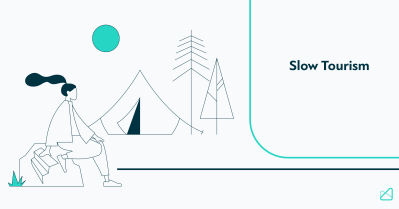
Slow Tourism Case Studies: Examples to Truly Understand Slow Tourism
14 min. The tourism industry is moving at an ever-accelerating pace. That’s because the tourism industry is perhaps one of the verticals that depend on the most factors. One of the main factors that affect it is social movements, given that tourism brands of all sizes always cater to the needs of consumers. One of […]
